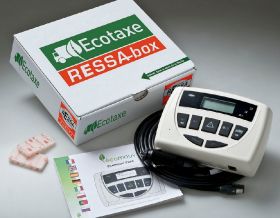
Live testing of the roadside equipment for France’s new lorry tax is now under way, ahead of its official launch on 1 October. Known as écotaxe, all lorries over 3.5 tonnes will pay between 9 and 15 euro cents per kilometre of chargeable road network travelled, regardless of where the vehicles are registered.
The scheme is a French implementation of a European framework law: Italy and Germany are just two member states that are interested in implementing similar schemes if it works in France. The majority shareholder in the écotaxe collection agency Ecomouv’ – the public-private body that holds a contract with the French state to collect the payments – is the Italian motorway business Autostrade per l’Italia.
Ecomouv’ will collect écotaxe from 600,000 French-registered lorries, as well as a further 200,000 foreign lorries. All these vehicles will need to carry an official electronic box that triggers roadside sensors when the vehicle drives along a chargeable sector.Some 15,000 kilometres of the French road network that used to be free will start chargingHGVtraffic from October. These include regional motorways without toll stations, sections of national roads (RN), cross-country départementale roads (D) and the approach roads to all but two ferry ports.
'Roadside equipment is in place and for now the government still appears to be set on launching écotaxe on 1 October,' Benoît Daly tells Eurofruit. He is the general secretary of national transport industry body the Fédération Nationale des Transports Routier (FNTR), representing 12,500 haulage companies of all sizes from specialists and SMEs to international groups.
Learning curve
The FNTR is taking a lead in educating its membership on the implementation of écotaxe. However, Daly also contends that meeting the 1 October deadline involves significant technical obstacles. These are not of the hauliers’ making, but could leave them non-compliant through no fault of their own, for example due to a shortfall in network capacity. The volumes of data that need to be processed are understood to be enormous.
As well as collecting tax for the state from traffic on national roads or passing back revenue to the regions operating regional motorways without toll stations, the écotaxe collected on the départementales will be channelled back to the regions, known in France as départements, that maintain them.
Depending on where the journey starts and ends, French hauliers will pay regional écotaxe rates within one département or the national rate on crossing regional boundaries. There are discounted écotaxe rates for the peripheral regions of Brittany, Aquitaine and Midi-Pyrénées. To make the accounting transparent, the French government will require hauliers to invoice écótaxe on a separate line after fuel surcharges, but before theVATline.
Administrative chaos ahead?
'The whole thing is up in the air,' suggests Patrice Prud'homme, board member of French national fruit and vegetable shippers’ association Aneefel and also a packer of lambs lettuce based near Nantes. 'The transporters haven't even sent us their October rate cards yet,' he complains. 'Nobody really knows how much it is likely to cost, either.'
As for recovering the extra costs from retail customers, there have been 'serious discussions', but no headway has been made. One retailer is said to have suggested doubling pallet heights to recover lost headroom and reduce trip numbers. 'But we have health and safety issues. There is a reason for the height limit of one metre 80 on a pallet.'
Earlier in the summer, Aneefel signed a letter sent by the national food carriers' trade association adding its weight to calls for écotaxe exemption on food consignments. The French government has already agreed such an exemption for milk tankers.However, Prud'homme is scathing about the government's attitude: 'There's no way that hauliers will be ready for 1 October, and the government is being an ostrich with its head in the sand.' He has not been able to get hold of the necessary écotaxe boxes for his own business and is apparently not alone in that regard. 'It needs to be put back to 2014!' he exclaims.
Elsewhere, the uncertainty appears widespread. 'Nothing is clear yet, but we expect it to add between 4 per cent and 4.8 per cent to our transport costs,' declares Sylvain Bard, communications director at French fruit exporter Blue Whale. As a marketing organisation for its growers, Blue Whale does not own or operate any lorries but is currently negotiating the impact of écotaxe as part of its haulage rates from October.
For French growers, the effect of écotaxe starts at the orchard, as soon as fruit is loaded on a lorry for a packing station. Depending on the route the driver takes and the distances involved, national and regional écotaxe rates will apply every time product is moved. 'This is an extra cost for the consumer, in the end,' Bard tellsEUROFRUIT.
Roadside readiness

Away from the administrative and network issues, highway infrastructure is indeed in place. Roadside gantries and control posts already installed can detect a lorry's arrival and determine a number of vehicle parameters, such as the number of axles and the presence or absence of an electronic box (pictured left). If one is not fitted or not working, vehicle data is transmitted to the French customs control centre. This may include pictures of the number plates and the driver.
The penalty for non-compliance will be a roadside fine of up to €750, with the vehicle impounded until the fine is settled; it will only be released on condition that it is driven to the nearest écotaxe service point, registered and a box fitted with sufficient credit to complete the journey.
For transport operators outside France, écotaxe could be a taste of things to come as far as moving consignments of fruit and vegetables around Europe is concerned. In the UK, the port of Dover alone handled nearly 2m lorry movements last year, of which roughly one in ten was inbound fresh produce. Add in traffic from the shuttle and south-coast ferry ports, such as Portsmouth, and the scope for chaos on both sides of the Channel is apparent.
The first weekend of August saw the first écotaxe protest: hundreds of Bretons blocked a dual carriageway, attacking an overhead gantry with angle grinders before using ropes to topple the structure. It will not be long before positions harden still further.






No comments yet